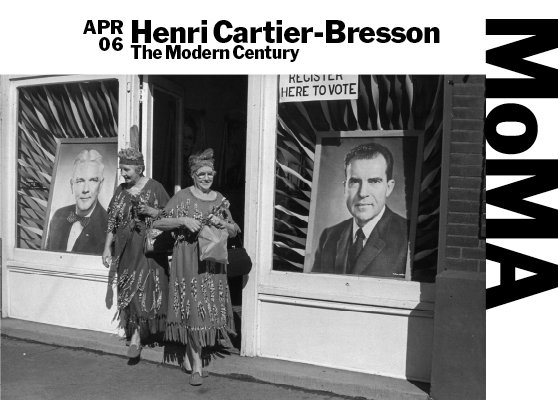Henri Cartier-Bresson
dal 5/4/2010 al 27/6/2010
Segnalato da
5/4/2010
Henri Cartier-Bresson
The Museum of Modern Art - MoMA, New York
The exhibition comprises 300 prints from 1929 to 1989, at least one fifth of them previously unknown to the public, and focuses on the most productive decades of the 1930s through the 1960s. Also included is a generous selection of original issues of Life, Paris Match, and other magazines in which many of the pictures first appeared. The show offers a fresh overview of that complex achievement by drawing upon a great deal of previously inaccessible information and images from the Henri Cartier-Bresson Foundation in Paris.

curated by Peter Galassi
The Museum of Modern Art presents Henri Cartier-Bresson:
The Modern Century, the first major retrospective in the U.S. in more than 30 years of one of
photography’s most original and influential masters, from April 11 through June 28, 2010. The
exhibition comprises 300 prints from 1929 to 1989, at least one fifth of them previously unknown
to the public, and focuses on the most productive decades of the 1930s through the 1960s.
Also
included is a generous selection of original issues of Life, Paris Match, and other magazines in
which many of the pictures first appeared. Cartier-Bresson’s uncanny talent for seizing lasting
images from the flux of experience, long identified with the title of his book The Decisive Moment
(1952), made him a leading figure both in photography’s experimental modernism of the 1930s
and the very different realm of photojournalism after World War II.
Henri Cartier-Bresson: The
Modern Century offers a fresh overview of that complex achievement by drawing upon a great
deal of previously inaccessible information and images from the Henri Cartier-Bresson Foundation
in Paris. Established in 2002, two years before the photographer’s death at the age of 95, the
Foundation has generously lent 220 prints to the exhibition, which is organized by Peter Galassi,
Chief Curator, Department of Photography, The Museum of Modern Art.
The exhibition is divided into 12 sections. The first is devoted to the early 1930s, when the
young Surrealist rebel used the quickness and mobility of the handheld Leica camera to invent a
new brand of creative magic. The second section, on the aftermath of World War II and the
postwar political and social transformations of Asia, introduces Cartier-Bresson’s long career in
photojournalism. The remaining ten parts are thematic rather than chronological.
The third,
fourth, and fifth chapters explore the photographer’s loving evocations of age-old patterns of life
in the East, the West, and in his native France. Sections on the United States and the Soviet Union
are followed by extended photo-essays on China’s “Great Leap Forward” and the daily routines at
Bankers Trust Company in New York. A selection of 34 outstanding portraits reveal Cartier-
Bresson as one of the great portraitists of the twentieth century.
The exhibition concludes with
sections devoted to encounters and gatherings of all kinds in the lively theater of the street, and
to the often unlovely rise of modernity—mechanization, industry, commerce, consumerism, and
leisure—around the globe. Taken as a whole, the exhibition presents Cartier-Bresson as a keen
observer of the global panorama of human affairs and as the author of the fullest, most varied,
and far-ranging account of the modern century that any photographer has produced.
The exhibition is supported by The William Randolph Hearst Endowment Fund.
Additional funding is provided by The Robert Mapplethorpe Foundation and Robert B. Menschel.
The publication Henri Cartier-Bresson: The Modern Century includes duotone reproductions of all
of the photographs in the exhibition and a rich variety of supplementary illustrations. Peter
Galassi’s wide-ranging essay offers both a great deal of new information and a comprehensive
new interpretation of Cartier-Bresson’s photography, by considering the many different and often
conflicting frames of reference that helped to shape it, from avant-garde art of the 1920s and
1930s to the business of photojournalism.
The supporting material—including a detailed
chronology of the photographer’s ceaseless travels, illustrated by maps of his travel routes, and a
thorough list of his picture stories as they appeared in magazines, illustrated by reproductions of
dozens of spreads, including several complete stories—will revolutionize the study and
appreciation of Cartier-Bresson’s work. Henri Cartier-Bresson is published by The Museum of
Modern Art and is distributed to the trade through Distributed Art Publishers (D.A.P.) in the United
States and Canada, and through Thames + Hudson outside North America. It is available at the
MoMA Stores and online at MoMAstore.org. 9 1/2 x 12 in.; 376 pp.; 435 ills. (75 color).
Press Contact
Paul Jackson, 212-708-9593 or paul_jackson@moma.org
Media Preview Tuesday, April 6, 2010, 10a.m.-12p.m.
The International Council of The Museum of Modern Art Exhibition Gallery, sixth floor
The Museum of Modern Art
11 West 53rd Street, New York, NY
Hours: Wednesday through Monday: 10:30 a.m.-5:30 p.m. Friday: 10:30 a.m.-8:00 p.m.
Closed Tuesday
Museum Admission: $20 adults; $16 seniors, 65 years and over with I.D.; $12 full-time students with
current I.D. Free, members and children 16 and under. (Includes admittance to
Museum galleries and film programs). Target Free Friday Nights 4:00-8:00 p.m.
Film Admission: $10 adults; $8 seniors, 65 years and over with I.D. $6 full-time students with current I.D.
(For admittance to film programs only)



